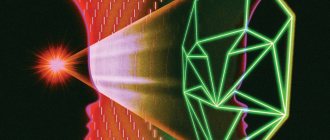Author Tatyana on 01/21/2014. Published by Personality Psychology Last updated: 01/12/2018
According to Sigmund Freud's theory of personality, personality consists of three elements. These elements - known in the psychoanalytic theory of the famous psychologist as the Id, Ego and Superego - interact with each other to create complex forms of human behavior.
Eid
The id is the only component of personality that a person has from birth. This aspect is completely unconscious and involves instinctive and primitive forms of behavior. According to Freud, the id is the source of all psychic energy, making it a fundamental component of the personality. The id functions in accordance with the pleasure principle - because of it, a person strives for immediate satisfaction of all his desires and needs. If these needs are not met on time, a state of anxiety or tension arises. For example, increased hunger or thirst will be followed by an attempt to eat or drink. The id plays a very important role early in life as it ensures that the infant's needs are met. If a child is hungry or uncomfortable, he or she will cry until the demands of the id are met. However, immediate satisfaction of these needs is not always even possible. If we were governed solely by the pleasure principle, then at some point we might realize that in order to satisfy our needs, we snatch things we like from the hands of other people. Such behavior would be destructive and socially unacceptable. According to Freud, the id attempts to relieve the tension created by the pleasure principle through a primary process involving the formation of a mental image of a desired object as a way of satisfying a need.
Ego in psychology
EGO, as an independent personality living inside each of us, has a huge influence on our thoughts, behavior and our entire lives. EGO exists, for the most part, at the level of our subconscious - where all our formed beliefs and habits are stored.
It can be difficult for a person to decide to make any changes in life - make new acquaintances, move to a new job, move to another city. Something always bothers him. Something is holding back. Forces you to come up with some excuses. While his consciousness understands the need and benefits of change.
This is the EGO interfering. It doesn't like discomfort. Doesn't like to feel like a stupid and inexperienced newbie.
EGO controls us. It can be so strong and convincing that we ourselves easily believe in our own excuses and justifications for the impossibility of changing anything in our lives. Our EGO is usually stronger than us.
I liked the description of the EGO (opens in a new tab) proposed by the famous psychologist and author of many books on psychology and psychosomatics - Luz Burbo.
Ego
The ego is the component of personality that is responsible for interacting with reality. As Freud believed, the Ego develops from the Id and ensures that the impulses created by the Id can be expressed in a form acceptable in the real world. The ego functions in the conscious, preconscious and subconscious. The ego operates based on the reality principle , which seeks to satisfy the desires of the id in possible and socially acceptable ways. The reality principle weighs the means and results of an action before taking it or abandoning an impulse. In many cases, the desires of the Id can be satisfied through delayed gratification - the Ego will eventually allow the behavior, but only at a certain time and place. The ego also releases the tension created by unmet needs through a secondary process in which the ego tries to find an object in the real world that matches the mental image created by the id in the primary process.
Ego is the source of identification
Consciousness is identified with what is happening - as if it projects its self-identification onto external objects. In this facet, the ego is memory - thoughts about the forms of external reality. When external forms are destroyed, the ego identified with them suffers as if it were being destroyed. If the object has a neutral evaluation, as in the spoon example, the suffering is nominal. However, if the object is given importance, things are different. When, for example, a person identifies with his car and gives meaning to this “part of himself,” he suffers when someone compares his car with a “cooler” brand, he suffers when his car is in an accident, because a piece of his ego is his self-identification is currently under threat of destruction.
The ego consists of many false selves - each person has dozens of such guises. The coarser and narrower the consciousness, the stronger the identification with the false self, because the false personality eclipses the entire sphere of perception. When an avid car enthusiast's only car is in an accident, he can experience near-death despair. If he has about a dozen such cars, then the projection of self-identification will be evenly distributed across all ten, and if one breaks down, the owner suffers less intensely. And if cars are not important to the owner, then he won’t survive at all.
This pattern can be traced in all personal qualities and external objects that a person owns. For a creative person, this is the undeniability of talent and the value of creations. For a loving husband, it is his beloved wife, whom he, as part of his ego, takes seriously, worrying if her behavior does not correspond to his identifications. A fanatic’s ego is projected onto the sphere of his fanaticism - in society he only talks about what he “fans” for, thus affirming his own “I”. For this reason, beginner esotericists talk so zealously about chakras, MLMers talk about “building a business,” Spartak fans talk about matches, etc. On progressman.ru I already indirectly touched upon this topic in an article about egregors, where I called the ego “the egregor of the name of oneself.”
We act on the principle of priority - on the principle that some things are more or less important at the moment. Every personality acts from the ego. Even if there is a war going on somewhere on earth, for our person, a pimple on the forehead may be a much more important phenomenon, because it is directly related to self-identification. The very importance of what is happening is another projection of the ego; this importance is conditional and subjective - everyone has something of their own that has its own exceptional importance.
What if a person lives for others - does charity, or helps loved ones? All this is also done under the dictation of the ego. And there is nothing wrong with that. Here I would like to introduce the term “wise ego”, which has found relative balance and compromise with life. Kind people get pleasure from helping others, so helping is important to them - this is their self-identity. Life is easier for such people, but it is still a search and a lack of true acceptance of life. Here, for clarity, we can draw a line between ego and selfishness.
Everyone is unique, or unique, only because he has his own set of false personalities with which he is identified. When people attach importance or meaning to the same thing, a common interest appears - a program that unites them. Such people can become friends as long as they maintain this interest. Friendship itself is a program that friends mutually reinforce. Without reciprocity, this program loses external supportive feedback and becomes less stable - not everyone is capable of being friends on the same level. Sexuality is a powerful strengthening of the ego's central identifications—bodily and personal qualities. Compliments, approval, and most importantly - direct intimate contact between partners - this is a colossal feed to the ego - support for its unstable nature. Based on this, one can understand why sex is so actively exaggerated in our society. During a successful contact, temporary satisfaction arises, then the scanning of reality for approval continues.
Ordinary “love” is self-identification with the activities of one’s favorite, which causes a strong dependence and an inappropriately exaggerated reaction to the behavior of the object of “love.” As a rule, they “love” those who have something in them that we ourselves lack. And after developing new qualities, “love” smoothes out. This topic was covered in more detail in the article on falling in love. From this perspective, we can say that love is such an instrument of evolution and development of consciousness.
Superego
The last component that develops in personality is the Superego. The superego is the aspect of personality that contains all of our internalized morals, values, and ideals. These we receive from both parents and society, they make up our sense of right and wrong. The superego contains the framework within which we make decisions. According to Freud, the superego begins to emerge around the age of five. The superego consists of:
- Ego ideal , which includes limits, rules, and standards of good behavior. These are actions that would be approved by parents or others with sufficient authority for the person. By following these rules, a person is filled with a sense of pride in himself, he realizes his value to others and feels inner integrity.
- Conscience includes information about what, from the point of view of parents and society, would be unacceptable. Such behavior is often prohibited and can lead to unpleasant consequences, punishment, or feelings of guilt and remorse.
The superego is aimed at creating more perfect and civilized behavior. It tries to suppress all unacceptable urges of the id and force the ego to act according to idealistic standards rather than realistic principles. The superego is present in the conscious, preconscious and subconscious.
Ego - what is it?
EGO is a subpersonality living within a person (personality within a person), based on the person’s accepted and established convictions and beliefs.
The main function of the EGO is to protect the individual from any inconvenience (discomfort). The EGO protective function is activated every time:
- attempts by an individual to change or get away from their beliefs or habits
- the conscious desire of an individual to learn or understand something new
- trying to listen to your inner voice and hear your true needs and goals
- trying to stand out from the crowd. Sharply ignore the lifestyle, clothing and behavior accepted in the social group to which the individual belongs (belonging to this social group was determined by the EGO)
- attempts to understand the true (psychosomatic) causes of their illnesses
EGO is a “stabilizer” that supports a person in a constant, familiar, comfortable state.
Interaction of Id, Ego and Superego
It turns out that there are so many competing forces that a conflict may arise between the Id, Ego and Superego. Freud used the term "ego strength" to refer to the ability of the ego to function regardless of what relationships exist between these components at the time. A person with a strong ego is able to effectively cope with such stress, and those with an overly strong or, conversely, weak ego may become too unyielding or too weak-willed. As Sigmund Freud believed, the key to a healthy personality is the balance between the id, ego and superego.
Sources: psychology.about.com Carducci, B. The psychology of personality: Viewpoints, research, and applications. John Wiley & Sons; 2009. Engler, B. Personality theories. Boston: Houghton Mifflin Harcourt Publishing; 2009.
Tags: , personality, behavior, superego, theory, ego
Have something to say? Leave a comment!:
Super Ego
A conversation about the Super-Ego should begin with the fact that in order to function effectively in society, a person must have a system of values, ethics and norms that will be compatible with the system accepted in the society around him. And all this can be acquired in the process of socialization - if expressed in the terminology of psychoanalysis, this occurs due to the formation of the Super-Ego, which also comes from the Latin language, in which “super” means “super”, and “ego”, as stated - "I".
The superego is the last component of the developing personality. According to Sigmund Freud, the newly born organism does not yet have a superego. It is acquired by the child in the process of his interaction with parents, teachers and other people who have a formative influence on the personality. As a moral and ethical force, the Super-Ego is a consequence of the child’s long-term dependence on his parents and manifests itself from the moment the child begins to distinguish between what is good and what is bad.
Among other things, Sigmund Freud divided the Super-Ego into two separate subsystems - Conscience and Ego-ideal . Conscience is acquired through parental discipline and is associated with what is considered "disobedient behavior", i.e. with the reason why the child is put in a corner, etc. Conscience includes the emergence of feelings of guilt, the presence of moral prohibitions and the ability to critical self-assessment. And the rewarding aspect of the Super-Ego is the Ego-ideal, which is formed from the approval and high ratings of significant people. The ego ideal determines the presence of feelings such as pride or self-respect.
The superego can be considered fully formed only when parental control gives way to self-control. The super-ego strives to finally inhibit the manifestations of all socially condemned impulses emanating from the Id, and directs the person to perfection in thoughts, words and actions, convincing the Ego that idealistic goals prevail over realistic ones.
These are the roles and significance of the id, ego and superego in Freud's psychoanalysis. In conclusion, we can only say that throughout a person’s conscious life, the Ego is looking for compromise solutions that can satisfy the Id and Super-Ego, which are in constant confrontation with each other.
We also recommend reading:
- Storytelling
- “I-concept”: characteristics, features, meaning
- Fear: psychological foundations and famous scientific studies of this phenomenon
- Personal identity
- Gordon Allport's Principle of Functional Personal Autonomy
- Theories of thinking
- Abraham Maslow "Motivation and Personality" - summary
- Temperament types
- Free association method
- Ideas of Carl Gustav Jung
- Sublimation in psychology
Key words:1Psychoregulation
What does the ego consist of?
The ego is a very complex structure, consisting of many mental elements. As I already said, it includes the analytical mind, internal dialogue, memory, the entire psyche and subconscious. This is our personality, character, all the programs laid down by our parents, society, government, and surrounding information. But from all this diversity I would like to highlight three very powerful psychic formations. You could say these are three huge elephants, on which the rest of the ego lies heavily, or in other words, the main formations of the ego, which set the direction for other components.
This is a sense of self-importance, fear of death and a feeling of self-pity. These are not even feelings, but a conglomerate of mental formations that give rise to certain thoughts, feelings and emotions that are unique to them.
The fear of death arose from the instinct of self-preservation, and gives rise to all the fears that a person has.
A sense of self-importance emerged as a result of separating oneself from the world, opposing it, placing oneself at the center of the universe. It is this that gives rise to such feelings as pride, selfishness, selfishness. It also gives rise to many other mental manifestations associated with egoism. Look here:
- I am cool;
- I am the best;
- I need to look good in front of other people;
- excessive self-confidence;
- shyness, uncertainty (also a manifestation of a sense of importance, but in a negative way);
- vindictiveness;
- noticing the shortcomings of others;
- lack of understanding of other views;
- excessive stubbornness in one's opinion.
And other feelings, emotions, mental manifestations, in fact there are a lot of them.
If someone encroaches on our sense of self-importance, we feel self-pity.
- I'm unhappy;
- what kind of world is not fair;
- I deserve more;
- I feel sorry for myself and stuff like that.
I will write separate articles about the feeling of self-importance, fear of death and self-pity, where I will tell you in more detail about these feelings and what needs to be done with them.
As you have already noticed, when speaking about the importance of oneself, I did not simply write that, say, a person has self-confidence, but excessive self-confidence. By this I once again wanted to emphasize that there is no need to get rid of the ego. Confidence, firmness of one’s views and other qualities of healthy egoism will always be needed by a person, without them he will not be able to interact normally with people and turn into a vegetable. We do not need to get rid of the ego, but simply bring the lower consciousness under control, get out of it. Climb to a bird's eye view, from where you can see your entire psyche. By putting our sense of self-importance under control, we will be able to have a strong opinion, but we will also be able to better understand the other person, we will be able to put ourselves in his place. This means that we will be able to interact better with people, and not be stubborn like a “ram”, not understanding other people’s opinions.
We will be able to separate ourselves from the world, but also understand that the world and we are one whole, we are also children of nature and we need to be friends with nature, and not destroy it.
Having put our fears under control, we will not stop fearing threats from the outside; the instinct of self-preservation will remain with us. But we will not shake with fear, losing our heads, which means we will be able to make sober decisions in difficult situations.
By putting self-pity under control, we will not complain about life and cry over our failures. But we can, for example, when we are very tired, feel a little sorry for ourselves and, leaving everything, go to rest, thereby maintaining our health.
That is, a person who has gone beyond the ego improves his life many times over and becomes a happy and healthy person.
The ego distorts your view of reality
The ego not only takes away our strength, but also prevents us from looking at the surrounding reality correctly. We look at the world through the prism of our thoughts, feelings and emotions. For example, if a person suffers from depression, everything around him will seem gloomy; if he is afraid of everything, then the world will seem hostile.
If a person treats everyone with warmth and love, then he will come across good people more often. The more perverted the ego, the worse the surrounding reality will be.
I have already talked about this in this article and will also touch on this topic a little lower. Now, to fully understand the topic, let's look at the structure of the ego.
Herd mentality and ego
Psychology understands the herd feeling as the desire of people to accept certain types of behavior under the influence of others, to follow trends. This is clearly reflected in what goods we buy, what films we watch, what clothes we wear. It is through the examples of fashion in accessories, clothing, cars, music, home decor, and even superstition and religion that we can say that people, in fact, lack exclusivity in terms of ego. A striking example of modernity is the widespread distribution of all kinds of advertising. And now people no longer think about what exactly they want: the choice has long been made for us, all that remains is to go and buy, express someone else’s opinion, agree with the crowd... Sociologists and psychologists study the relevant sections of group intelligence, the wisdom of the crowd and the decentralization of decision making.
How does EGO manifest itself?
How to detect the influence of your EGO?
Here are examples of its manifestations:
- You always know everything yourself. It is difficult for you to admit that you don’t understand something, to ask someone about something, to listen to other people’s opinions or advice.
- You must graduate from a good university. And preferably with honors! I remember how when I studied at my first university, girls from the Faculty of Economics begged the teachers for A's. “I’m going for a red diploma! Don’t ruin my life!” - Iron argument.
By the way, I later received a second higher education - my EGO decided that one was not enough for me.
- You want to prove to everyone what you are worth. Must win competitions or competitions. Place certificates, cups and medals in a visible place so that everyone knows who you are and what you represent.
- You achieved something and stopped developing and moving on. You are proud of your past achievements and stop there.
- It is difficult for you to admit your mistake and apologize.
- You buy yourself a new car because someone else has a better and more expensive car. Although you like your car and are happy with it.
- You blame any circumstances for your deplorable situation (family, children, poor parents, lack of connections, etc.).
- You don’t have time to think about something new, read a new book or do something unusual and useful for yourself. You say you don't have any time.









